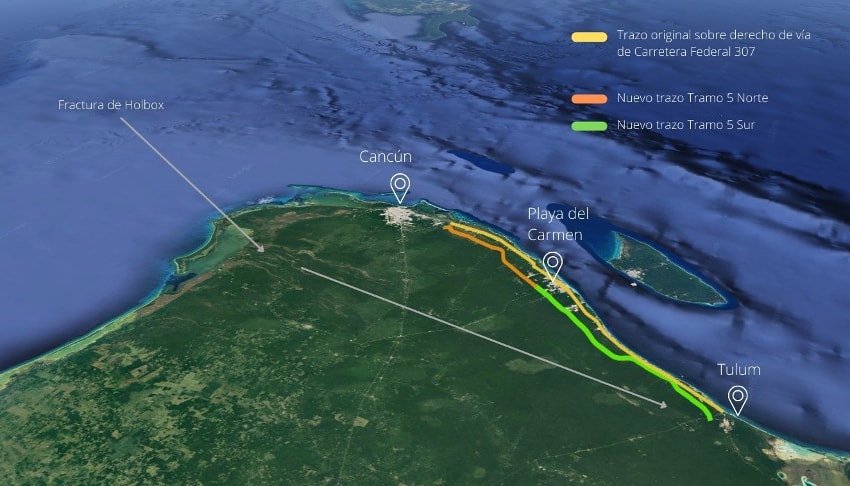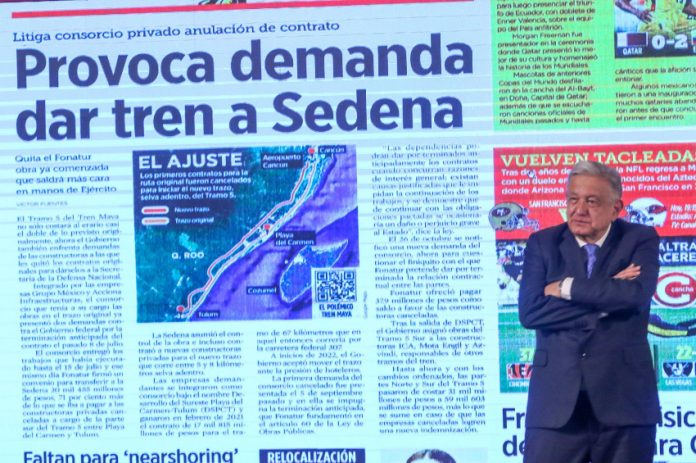Two companies have initiated legal action against the federal government after their contract to build a section of the Maya Train railroad was terminated.
A consortium made up of Grupo México and Spanish firm Acciona filed two lawsuits related to the early termination in July of their contract to build the Playa del Carmen-Tulum section of the railroad, the newspaper Reforma reported Monday.
One lawsuit filed in September directly challenges the termination of the 17.8-billion-peso (US $912.4 million) contract the consortium was awarded in early 2021, while the other suit filed last month challenges the severance payment, or finiquito, the two companies were to be paid by the National Tourism Promotion Fund (Fonatur), which is managing the US $10 billion railroad project.
The Ministry of National Defense (Sedena) was given responsibility for building Tramo 5 Sur, as the southern part of Section 5 of the railroad is known, after the consortium’s contract was terminated. That means the army is in charge of construction of the entire stretch of railroad between Cancún and Tulum, popular tourist destinations in the Caribbean coast state of Quintana Roo.

President López Obrador said Monday that Sedena had contracted other private companies to work on Tramo 5 Sur after the contract awarded to Grupo México and Acciona was terminated.
“There was a breach in the contract … of Grupo México. So an agreement was reached that other companies were going to participate because [Grupo México and Acciona] weren’t complying [with the terms of the contract], that was the reason,” he said.
“They were notified that we needed to urgently finish that section, and it was [subsequently] assigned to three [other] companies,” López Obrador said.
The president said he was unaware that Grupo México and Acciona had initiated legal action against the government before Reforma reported on the lawsuits. He asserted that nothing illegal has occurred.
In a statement issued later on Monday, Grupo México said that the consortium it formed with Acciona “has carried out all the actions required by Fonatur to formalize the closure of the contract and proceed to conciliation and payment for the completed work.”
It said that the early termination of the contract was due to “the technical impossibility of completing the project in 11 months and delivering it in July of 2023.”
Tramo 5 Sur was originally slated to run near the coast but was moved inland after the Playa del Carmen business community complained that the construction of the railroad parallel to Federal Highway 307 would effectively divide the city in two. Large swaths of the Mayan Jungle have been cut down to create a passage for the rerouted section.
Grupo México rejected López Obrador’s claim that the consortium had breached its Maya Train contract, and asserted that it was able to avoid committing a breach in the future by declining to take on a rerouted project whose completion deadline is unreasonable.

“The seriousness and professionalism of the consortium led it to decline [the project] due to the complexity and haste imposed on the completion of the project,” it said.
“… The consortium didn’t commit any breach during the life of the contract,” added Grupo México, a conglomerate owned by the billionaire businessman Germán Larrea.
It also said that all its actions directed at the finalization of its contract followed a legal and administrative procedure established in accordance with Fonatur’s requirements and “within a framework of dialogue and good faith.”
Grupo México didn’t specifically mention the legal action it has initiated against the government, but noted that it had “accepted the proposal of the government that the finiquito [amount] be derived from the analysis and conciliation that will take place with military engineers.”
That suggested that the consortium was at least prepared to withdraw its second lawsuit in favor of negotiation with the government. However, Grupo México stressed that it “maintains its absolute conviction that the finiquito must be transparent, in accordance with the facts and legality.”
Reforma reported that Fonatur offered to pay a finiquito of 37.9 million pesos, while López Obrador claimed that the consortium wants a larger payout. He said the government would seek to reach an agreement with the two companies, but stressed that Fonatur would only pay a fair amount.
“A fair [amount] will be paid because it’s no longer the time of before,” López Obrador said, alluding to the corruption he says was rife under previous governments. “The budget belongs to the people, it’s the people’s money, officials are simply administrators of the people’s money,” he said.
When the government terminated the contract it awarded to Grupo México and Acciona, it authorized the transfer of 30.4 billion pesos (US $1.56 billion) to Sedena to complete construction of Tramo 5 Sur. That amount is about 70% higher than the value of the contract awarded to the two-company consortium.
An environmental impact statement that came to light in July showed that the cost of the entirety of Section 5 between Cancún and Tulum would be 59.6 billion pesos (US $3.06 billion), up 92% from an original estimate of just under 31 billion pesos.
A total of seven railroad sections will be built to link cities and towns across five southeastern states: Tabasco, Campeche, Yucatán, Quintana Roo and Chiapas. Tourist, commuter and freight trains are slated to run on the 1,500 kilometer railroad, which is scheduled to begin operations in 2023, despite doubts about whether it can be finished by then.
With reports from Reforma, Animal Político and La Jornada
